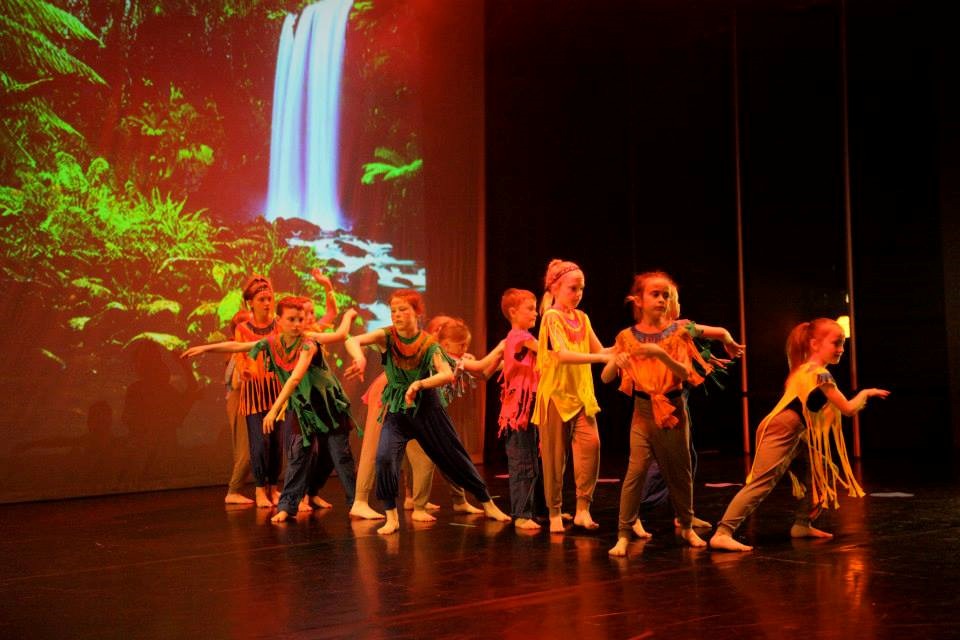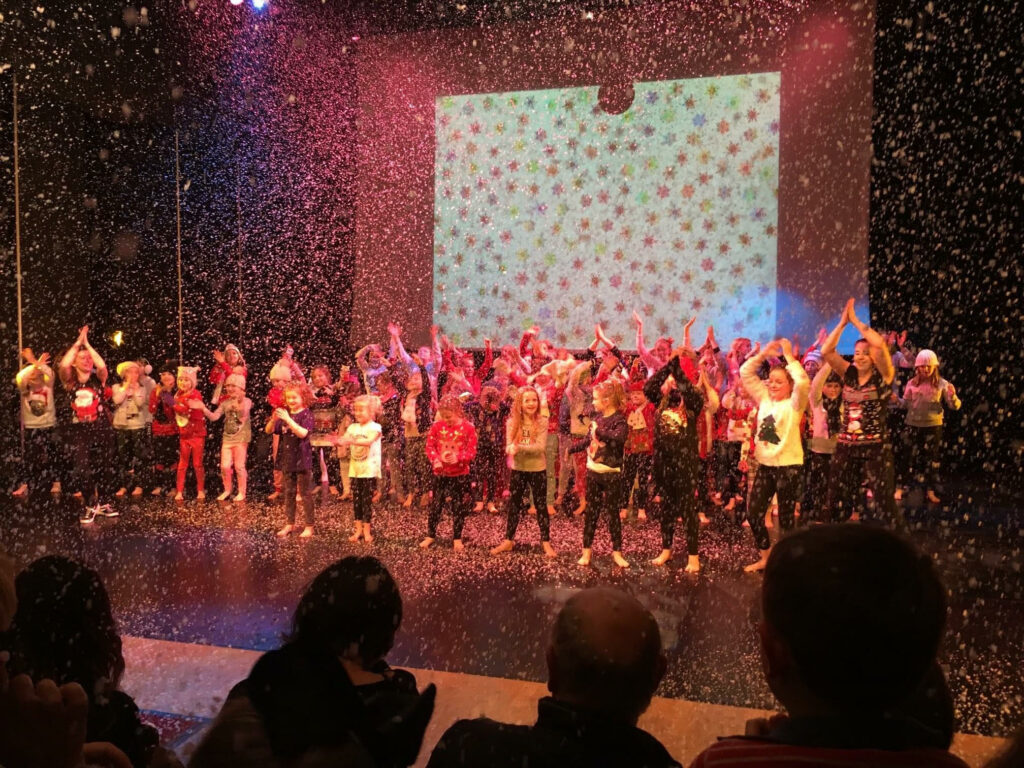In response to the lockdown triggered by COVID-19, many arts organisations have taken their work online, sharing content for audiences to view for free. However, creating participatory engagement online is much more challenging and, as a sector used to being face to face with people in their practice, it’s clear that the current restrictions change the nature of participatory arts based activity substantially.
Following a vital conversation on social media led by Guy O’Donnell, Learning and Participation Producer, National Dance Company Wales which opened a discussion on how we can deliver participatory arts effectively, a range of partners are collaborating to lead Zoom discussions for the sector where we can talk about the impact of the lockdown on our work and work creatively together to think beyond the lockdown.
In partnership with ArtWorks Cymru a series of free Zoom meetings have been set up to discuss and share current working practices in participatory delivery.
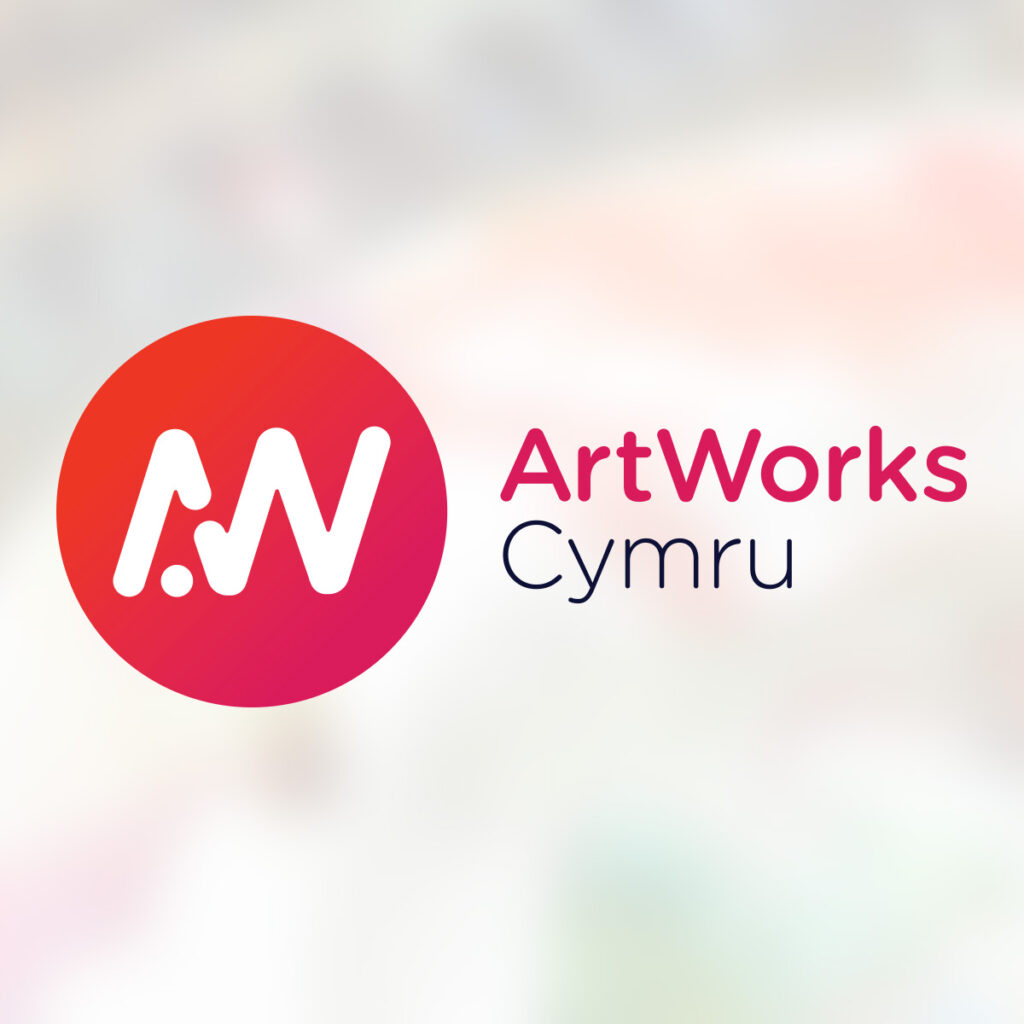
Thinking Beyond the Lockdown
These Zoom meetings will explore how we think beyond the lockdown. We’ll explore what the future might hold, what we might keep from our online experiences, and how we live with an uncertain future.
Director of Dawns i Bawb, Catherine Young is presenting at the second Zoom meeting on Wednesday the 10th of June 3-5pm. The meetings are free to attend but numbers are limited. Catherine gives a personal response below to the challenges and solutions she has created to support participatory dance delivery in the current climate.

Hi can you tell me a little about yourself and your practice?
Hi my name is Catherine Young and I am Artistic Director for Dawns i Bawb – the Community Dance Organisation for North West Wales.

I have worked in the Community Dance sector for over 20 years. I graduated with a BA Contemporary Dance from De Montfort University, did a 2 year Community Dance apprenticeship before working as a Community Dance Practitioner in Ceredigion for 18 years before coming to Dawns i Bawb 4 years ago. I have also worked as an independent choreographer, creating professional work within community contexts. The values connected to Community Dance have always been a passion of mine and I love creating work with people of all walks of life. I am also very passionate about the Welsh language and this is always reflected in every creative thing I do. I believe that Dawns i Bawb is the only Welsh language dance organisation in Wales and I am very proud of this fact.
What challenges did lockdown present to delivery of your participatory practice?
This has been the biggest challenge that we as a Community Dance organisation and the sector as a whole, has ever faced. Community Dance is about a connected and shared experience – bringing people and communities together through dance. These important factors have not disappeared and in fact, are more important than ever. But our old way of working has gone. Our challenge now is to maintain our purpose but find a new way of doing so. We have to respond and adapt to our current way of life. For me personally, the lockdown has caused me to question a lot of our current way of working – from how accessible we really are to how our relationships with freelance dance artists. I’ve been having many of these conversations with Arts Council Wales recently and I think that this situation is going to raise many conversations. We need to be brave and have these conversations. I think our future dance sector might look very different after this. And perhaps it should.
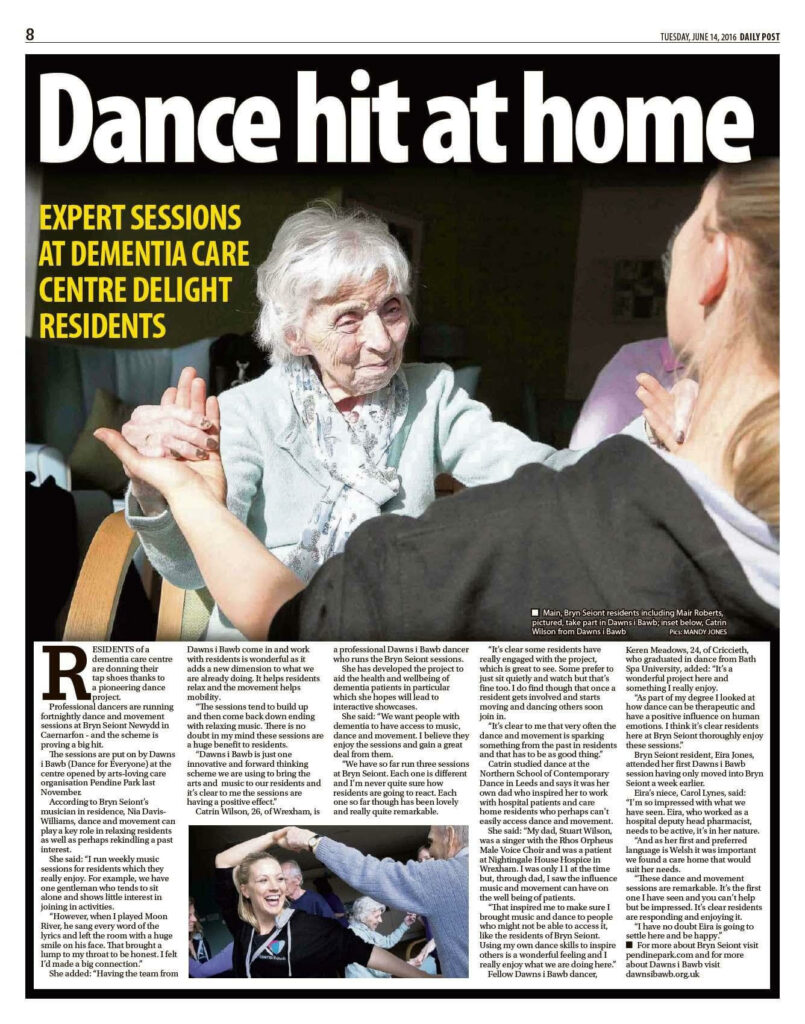
What systems did you put in place to ensure delivery?
It took about 6 weeks in lockdown before we started focussing on delivery. In less than a week we lost our entire dance programme, had to leave our office and were then placed in lockdown and like with everyone, it was a huge shock. Myself and my staff needed time to come to terms with everything so we took small steps at the start. I then began looking at what our short term future might look like and worked with my Board and Arts Council Wales Officer to put a 6 month Contingency Plan in place. I thought at the start that it would just be a matter of waiting for the storm to pass but after a few weeks began to change my attitude to our situation.
I’ve always felt it important that we as artists, respond to the world around us and really, this situation is no different. There is nothing in the arts that is impossible and I have always believed this. Once I changed my way of thinking, the creative juices started to flow! I looked carefully at our programme and all our different participants and began to put plans into place of how we can keep connected to them. Our programme is very varied and we work with some of the most vulnerable people in our communities. We are now about to dive into the world of online working starting with our after school clubs for children and young people. We almost have a different plan for each one of our groups as they all have very different needs.

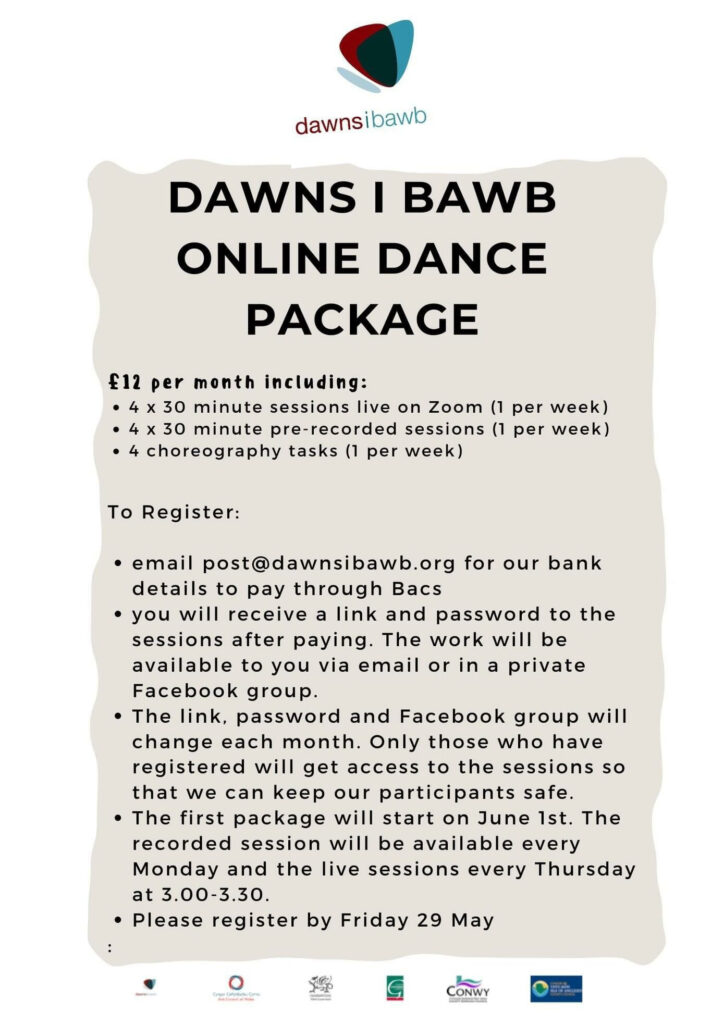
Did you have any particulate challenges or success that you would like to share?
As we venture into online working, the most important thing for me is that our ethos remains as strong as ever. It is crucial that we hold on to our values. I know some find out odd when I say this as a Director of a dance organisation, but dance is not the main focus of what we do. Our focus is on people, on communties, on connection, relationships and the shared experience. Dance is the medium through which we enable this to happen. I want to ensure that even though our way of working has changed, that all these important elements remain.
This will be the biggest challenge that we face, not just Dawns i Bawb but the sector as a whole. Being able to carry on with our programme has certainly challenged me to think outside the box! As we take work on line, one of the challenges has been how we keep connected to the most vulnerable people that we work with. One example is our Care Home Programme. We were working regularly with around 20 care homes before lockdown, mostly with people who are living with Dementia. We contacted staff to discuss whether online sessions might work to be told that the majority were ‘shielding’ and unable to leave their rooms or be in contact with other residents. We therefore needed another way to be able to communicate with the residents.

I successfully applied for a small grant from Community Foundation Wales and received permission to adapt a grant that we had received previously from Peoples Health Lottery to enable us to buy around 25 electronic tablets to loan to care homes that would enable people to receive 1:1 dance activity in their rooms – either live or already pre-recorded into the tablet. Tackling social isolation is a big part of our work and this is more crucial than ever. Therefore, I want to ensure that the tablets can be used for more than DiB activity – they can be used for people to keep in contact with loved ones and to receive creative activity from our partner organisations. For example, I have been talking with Conwy Culture Centre about the idea that people can access their archives through our tablets.

Conwy Culture Centre
What are your plans for future delivery?
I think we have to face the reality that we will be working like this for a while and that online working might not just be a temporary measure. Even if we can start back some kind of activity in September, strict social distancing will still be in place so our sessions are going to look very different for quite a while. Everything is still so uncertain so every plan I make has about 3 back up plans attached to it! Dawns i Bawb does an annual Christmas production every year. It is our highlight with 100+ performers and 500+ audience. I am currently planning 3 different scenarios to enable the performance to happen in December. It might have to be a whole different experience, but it will happen.
A range of organisations have worked to continue delivery of their art form during lockdown are there any that you would like to mention that you found either professionally or personally useful?
The way that the Arts sector in Wales has responded to all of this is amazing. I would like to mention ACW for the way that they have supported and taken leadership of the situation and for the way they have supported me and Dawns i Bawb. They have tons of useful resources on their website. Also People Dancing for the support they have offered the Community Dance sector and the useful resources they have put together which are on their website.

Below is the presentation that Catherine gave to those attending the Zoom Dance Participation Meeting on Wednesday the 10th June. Thanks to Catherine for supporting us to share this.
Hello everyone. I am Catherine and I’m Artistic Director for Dawns i Bawb which is the community dance organisation for North West Wales, developing dance provision to people of all ages and abilities throughout Gwynedd, Conwy and Ynys-Môn.
We are now halfway through our 11th week of lockdown and I wanted to take this opportunity to share our experiences and responses to the situation with you.
Due to the nature of our work I think that we began to experience the effects of the situation about 3 weeks before the official lockdown. We work with some of the most vulnerable people in our communities including those living with Dementia and those that are care home residents. In early March we began to receive phone calls from our care homes stating that they were putting their home under precautionary lockdown. I remember it coming as a shock – it didn’t feel at that time that we needed to be worrying about the virus yet. Within three weeks everything had changed.
On Tuesday 17th March we lost our entire programme in one day. By Friday 20th March we had to leave our office with immediate effect. Everything had happened very brutally and very quickly.
We therefore had to put plans in place very quickly. My first response was to my staff – to support them and set them all up on a homeworking system. This was challenging in itself as we didnt have enough warning to really plan this but we found our way through it and are fortunate that we have been able to keep the Company ticking over 11 weeks on.
I also put support in place straight away for our freelance dance artists. We have a fantastic team of 6 freelancers and they all lost their work in one day. I think one of the hardest things I’ve had to do was to phone each of them to tell them that their work was stopping immidiately. Two of them as new graduates, had only been freelancing for 2 months. I am pleased that we have been able to support them. I ensured that we honoured all the contractual work that they had lost and have been fortunate to have been able to adapt a few project led grants that has enabled me to carry on giving them all paid work during the lockdown.
I also put a 6 month Contingency Plan in place to establish our financial and strategic situation. I have based this on different scenarios of when we might come out of lockdown – the impact on DiB if this happens in July, September or even January. Things are changing so quickly and on an almost daily basis that I feel that I’m updating this Contingency Plan almost every week! We have already passed scenario number 1 – which would have seen us returning to work after Easter. As we move further and further through the scenarios the situation gets more concerning. If we end up reaching our final scenario of getting to January and still not being able to deliver work, the consequences will be serious to our future.
It took around 6 weeks to establish some kind of routine and to really, accept our situation and begin dealing with the shock of it all. Within this time, it started to become clear that this was no longer a matter of waiting for the storm to pass and then getting back to normal. We were having to begin to consider new ways of working – a new way of running our Company and a new way of delivering dance activity and engaging with our participants again.
Dawns i Bawb works with a vast range of people. With all of our programme planning, it was necessary to consider each group seperately – their needs, accessibility, priorities, objectives – and the consideration of online activity was no different. It has been fantastic to see the amount of arts based activity that had gone online and I learned alot from many of our colleagues. As we began considering taking our work online, I began to support our tutors in preparing for this and created an online working policy for staff. I had very little resources to work from with this as it is of course a new way of working for us all but I have managed to create a way of working that I have confidence in and that I feel is safe and maintains our professional standards to the best of our ability.
At the start of June, we launched our online dance package for our after school clubs of children and young people. This one has been the most straightforward one to set up. We have created an online monthly dance package which people sign up to beforehand for the entire month. We have put a small cost on the package which will enable us to cover tutor costs. We have had a good response to this and have exceeded what was the minimum intake needed to be able to cover costs. The package includes a live session each week, a recorded session each week and a creative task for participants to do in their own time and then show their work in the next live session. All participants have received a safeguarding policy and disclaimer to ensure everyone’s safety. We did our first live session to around 20 participants. It was a happy and emotional experience. Our young people are so resilient – working virtually did not phase them one bit.
Just before lockdown, we were halfway through two project grants. Both were for our care home programme and for people living with Dementia. As we could no longer carry on running the projects in their usual format, we received permission to adapt the project conditions to create online sessions for the care homes. This also included creating an online version of our interactive performance ‘Dancing the Decades,’ which was created last year specifically for care homes and people living with Dementia. We were due to tour the performance around Conwy during the Easter holidays.
I knew this would be much more challenging to develop than our after school clubs online package. We contacted care home staff about the idea and almost all told me that they wanted sessions but that all residents are sheilding and not able to leave their bedroom, let alone be able to go to their lounge and dance with others. Conversations with care staff made it clear to me just how serious the situation was in care homes and the effect this isloation could have on residents and our participants.
An important element of all our work is connecting with people and tackling social isolation and this felt more important than ever. I therefore started to explore the idea of 1:1 sessions and applied for, and got, a grant from Community Foundation Wales to enable us to buy around 20 electronic tablets that we can loan to care homes that will enable us to offer 1:1 dance sessions to those that are sheilding. While dance is an important element of this work, connection and communication with others is the most important factor. Therefore, these tablets will not just be limited to DiB activity. We will be linking up with other partners to create a kind of ‘buddy scheme’ where people can participate in a session together, can be in contact with one another even perhaps, where families of the residents can participate or just have a chat together. We will also enable our partner organisations to engage with residents through the tablets. For example, we are discussing how Conwy Culture Centre can make online versions of their achives that people can access.
Within time I will begin looking at other aspects of our work and what their near futures might look like including our fitness programmes and our schools work. I am carefully following reports by our First Minister and Education Minister everyday hoping these ongoing announcements will help me to shape this. DiB creates an annual Christmas production every year which is our biggest event of the year involving over one hundred performers and over 500 audience. I know it is an event that our participants and communities look forward to and I will ensure that the performance will happen in December. I dont know what our situation will be at that time or if our theatres will be open once again. Therefore I am creating a contingency plan for the performance with 4 sceanrios. Even if we find ourselves still in lockdown, the performance will happen!
The lockdown has been quite an astonishing time. Its caused me to question so many things from the purpose of what we do to our relationship with our freelance dance artists. What is obvious to me is that I shouldn’t be looking towards getting back to normal, but looking at our way forward. As someone said to us in one of our network meetings recently – to question what do we take with us but also what do we leave behind?
Working online has raised the question of accessibility to dance activity from both angles. On the one hand, I feel it has the potential to open dance to those that for whatever reason do not attend dance sessions – whether its because of transport issues or health issues making someone unable to leave their home including social anxiety. We all know of the health benefits for dance and therefore have this opportunity to make dance more readily acaibale and accessible. We know that there are still people in our communities that want to attend a dance class but do not believe that they can be a dancer and the idea of walking in to a dance studio is too overwhelming. Online sessions can help tackle this and with this in mind, I think that I will keep some aspects of online activity when we come out of lockdown and when we can get back together.
There is the other issue of course of the inaccessbility online working can cause. Do the more vulnerable of our communities, or those living in poverty have access to wifi and equipment? Is it safe for everyone and how do we know? What about our participants with physical or learning difficulties? Can we offer the same experience that we did before the lockdown? Are we losing some very important features of our work by not being in the same room? And how do we overcome this?
I also want to come out on the other side of this having had many conversations about our relationships with our freelancers. This isn’t a new issue and is in fact one I have been questioning since being with DiB and is one I was planning to tackle in our Investment Review application. Our freelancers are at the heart of our Company and are the ones who have professionally been hit the hardest in all of this. It has hit home just how vulnerable they are professionally but also how much we depend on them. I have noted with ACW that we as a sector need to seriously tackle this and consider setting a pay-scale and more solid working conditions.
What has become very clear over the past couple of weeks is that the biggest challenge for us is not the lockdown but the after-effect – the getting back on our feet. We can make socially-distanced dance sessions happen on a practical level but they are no way financially sustainable. Income from sessions cover the costs of those sessions including tutor fee and expenses and studio hire. Some of our sessions have up to 25 participants. If we had to create smaller groups of say, 5 participants, it means that our costs for that session will be 5 times more than usual but the income will remain the same. And thats just for one session. We can run up to 15 groups a week usually. If we had to add extra sessions on to all of those 15 groups the costs would be beyond anything we could manage. Additionally, we probably wont see our more vulnerable groups until next year which means we will be without a large chunk of our programme for quite a while. We have a lot of hurdles in front of us and at the moment, I do not know what the answers are.
However, as we keep going through this and start planning our way forward, my biggest question to myself is how do we remain relevant? How do we develop online activity and plan for our next steps while maintaining our purpose and ethos as a community dance organisation? Everything that we do is centered around connection, bringing people together, creating together and being with one another. We know live in a time where these things, all these things that are so important to Community Dance, are no longer possible in its original form. We need to create new ways of being together and not forget what is the purpose of our art form. We still have many challenges ahead but also now have the opportunity to really look at what we do and what we want to take forward?

